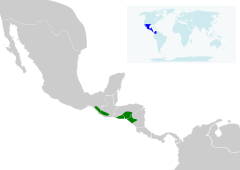Blue-tailed hummingbird
| Blue-tailed hummingbird | |
|---|---|
| | |
| Amazilia cyanura. Museum specimen | |
| Scientific classification | |
| Kingdom: | Animalia |
| Phylum: | Chordata |
| Class: | Aves |
| Order: | Apodiformes |
| Family: | Trochilidae |
| Genus: | Amazilia |
| Species: | A. cyanura |
| Binomial name | |
| Amazilia cyanura Gould, 1859 | |
| Synonyms | |
|
Saucerottia cyanura | |
The blue-tailed hummingbird (Amazilia cyanura), sometimes placed in the genus Saucerottia, is a species of hummingbird in the Trochilidae family.
Subspecies
Subspecies within this species include:[1][2]
- Amazilia cyanura guatemalae - occurs in the southeastern part of the state of Chiapas in Mexico and southern Guatemala
- Amazilia cyanura cyanura - occurs from southern Honduras to eastern El Salvador and northwestern Nicaragua
- Amazilia cyanura impatiens - occurs in northwest and central Costa Rica

Distribution
This species can be found in Costa Rica, El Salvador, Guatemala, Honduras, Mexico, and Nicaragua.[1][3]
Habitat
Its natural habitats are subtropical or tropical dry forests, subtropical or tropical moist lowland forests, and heavily degraded former forest. These hummingbirds can be found in humid and dry oak or pine forests, in open woodlands and in coffee plantations, at altitudes of 3,300 feet or lower.[4]
Biology
Amazilia cyanura feed on nectar of many flowers, but especially of Inga flowers.[4] It is also an agile flycatcher.[5]
Description
Amazilia cyanura can reach a length of 9–10 millimetres (0.35–0.39 in). These hummingbirds show a metallic deep green plumage, a characteristic deep blue tail and in proper lighting chestnut or rufous wings. Rump and uppertail coverts are purplish. The bill is black. Females are duller than males and have a grayish belly, and less rufous wings. This species is very similar to Steely-vented Hummingbirds (Amazilia saucerrottei) and to Berylline Hummingbird (Amazilia beryllina).[4]
References
- 1 2 3 BirdLife International (2012). "Amazilia cyanura". IUCN Red List of Threatened Species. Version 2013.2. International Union for Conservation of Nature. Retrieved 26 November 2013.
- ↑ IOC World Bird List
- ↑ Avibase – The world bird database
- 1 2 3 Arizmendi, M. C., C. Rodríguez-Flores, C. Soberanes-González, and Thomas S. Schulenberg. 2013 Neotropical Birds On Line T. S. Schulenberg, Editor
- ↑ Focus on nature
- del Hoyo, J., Collar, N.J., Christie, D.A., Elliott, A. and Fishpool, L.D.C. 2014. HBW and BirdLife International Illustrated Checklist of the Birds of the World. Lynx Edicions BirdLife International
- Clements, J. F., T. S. Schulenberg, M. J. Iliff, B.L. Sullivan, C. L. Wood, and D. Roberson. 2011. - The Clements checklist of birds of the world: Version 6.6.
